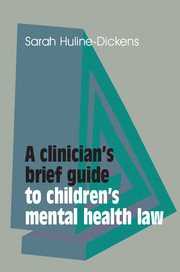Book contents
- Frontmatter
- Contents
- Foreword
- Acknowledgements
- List of cases
- Common abbreviations and terms
- 1 Introducing child mental health and the law
- 2 The rights of the child
- 3 The Children Act 1989 and the 2004 amendments
- 4 Consent to treatment
- 5 Confidentiality
- 6 The Mental Health Act
- 7 The Mental Capacity Act
- 8 Juvenile justice
- References
- Index
4 - Consent to treatment
Published online by Cambridge University Press: 02 January 2018
- Frontmatter
- Contents
- Foreword
- Acknowledgements
- List of cases
- Common abbreviations and terms
- 1 Introducing child mental health and the law
- 2 The rights of the child
- 3 The Children Act 1989 and the 2004 amendments
- 4 Consent to treatment
- 5 Confidentiality
- 6 The Mental Health Act
- 7 The Mental Capacity Act
- 8 Juvenile justice
- References
- Index
Summary
Historical laws protecting autonomy form the legal basis of consent to treatment in England. Obtaining consent for an intervention has a clinical as well as a legal purpose: to secure cooperation and increase the likelihood of treatment success. It is important to bear in mind that, for those under 16 years of age, emergency treatment that is necessary and cannot be delayed can be given under common law. Medical treatment in an emergency for those aged 16 and above who lack capacity is now governed by the Mental Capacity Act 2005, which has replaced the common law.
When and in what circumstances a child has the capacity to consent to treatment is the central theme of this chapter. It is important for clinicians to know some practical aspects of consent to treatment and understand the scope of parental responsibility when it comes to treating children and young people. It is clinically and historically interesting to know about the seminal Gillick case, the legal principles deriving from it, and the clear distinction that has resulted in law between children of 16 years and above and those who are below 16.
They are these: that with a child under 16 who is not Gillick competent, consent can be given by someone with parental responsibility in accordance with the child's best interests. Yet although a so-called Gillick-competent child under the age of 16 can give consent to an intervention, their refusal can be overruled by someone with parental responsibility or by the court. This can seem confusing, and appears to encapsulate a dilemma not only for the clinician, but also for society. We might wish to recognise adolescent autonomy, but we do not wish that children and young people should be allowed to come to harm on the basis of their own or their parents’ refusal of necessary and urgent treatment.
There are, of course, special situations for the giving of consent in cases of mental illness: detention and treatment under the Mental Health Act 1983 is one of these and is discussed in Chapter 6. Consent is not required for treatment of conditions directly resulting from a mental disorder if a child or young person is detained under certain sections of the MHA. An example of this would be feeding for anorexia nervosa in a young person detained under section 3 of the Act.
- Type
- Chapter
- Information
- Publisher: Royal College of PsychiatristsPrint publication year: 2016

